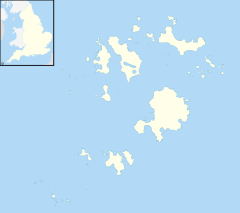Bryher, Isles of Scilly
| Bryher | |
|---|---|
 Bryher seen from Tresco |
|
| Bryher shown within Isles of Scilly | |
| Population | 84 (2011) |
| OS grid reference | SV876361 |
| Civil parish |
|
| Unitary authority | |
| Ceremonial county | |
| Region | |
| Country | England |
| Sovereign state | United Kingdom |
| Post town | ISLES OF SCILLY |
| Postcode district | TR23 |
| Dialling code | 01720 |
| Police | Devon and Cornwall |
| Fire | Isles of Scilly |
| Ambulance | South Western |
| EU Parliament | South West England |
| UK Parliament | |
Bryher (Cornish: Breyer, place of hills) is one of the smaller of the inhabited islands of the Isles of Scilly.
The island has a length of 2 kilometres (1.2 mi), a maximum width of 1 kilometre (0.62 mi) and an area of 134 hectares (330 acres), including Shipman Head, which rises to 42 metres (138 ft) at the northern end of the island. Bryher lies to the west of Tresco, and is separated from that island by the Tresco Channel, once the main anchorage for the islands and now an area where sandflats are exposed at low tide. Off the southern end of Bryher is the uninhabited island of Samson. It is possible to walk between the three islands at the lowest spring tides.
The settlement at the Pool / Hell Bay Hotel is the westernmost in England. Without the tidal island of Gugh included, St Agnes is marginally smaller than Bryher in either population or area; however if Gugh is included with St Agnes, which is the common interpretation, then Bryher is (again, marginally) the smallest of the populated isles of Scilly in area and population.
The centre of Bryher is mainly low-lying with arable fields, pasture and housing and is where most of the population of 84. On the west side is the brackish Great Pool overlooked by the Hell Bay Hotel and in the south are sandy beaches, a common feature on the island, Rushy Bay being an example. The island lies within the Isles of Scilly Heritage Coast, is part of the Isles of Scilly Area of Outstanding Natural Beauty and untennanted land is leased by the Duchy of Cornwall to the Isles of Scilly Wildlife Trust which is using ponies and red ruby cattle to graze the overgrown areas as part of the Waves of Heath project.
...
Wikipedia

